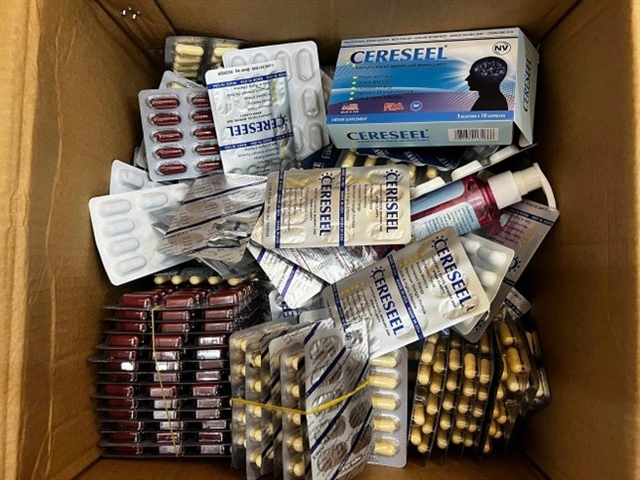 Society
Society


|
| Counterfeit medicines that were recently confiscated. Photo courtesy of Ministry of Public Security |
HÀ NỘI — Tackling counterfeit goods in the health sector requires determined and stringent action, with no exceptions or protected areas, said Minister of Health Đào Hồng Lan.
“People are extremely confused. They do not know which products are legally allowed for circulation and which are fake or counterfeit,” Lan said at a national online conference organised by the Ministry of Health on Friday to review the campaign against smuggling, trade fraud and counterfeit medical products.
Lan said the health ministry believes that pharmaceuticals, health supplements and cosmetics play a vital role in disease prevention, treatment and public health.
“Combatting the production and sale of counterfeit food and medicine has long been closely monitored by the Government, the health ministry and relevant agencies. This fight is not new. It has been carried out consistently and continuously for many years,” the minister told the meeting.
The ministry has focused on improving and revising legal documents, especially in the area of food safety, which involves technical standards and practical enforcement issues as well as managing goods on e-commerce platforms and social media. The issue remains complex and challenging.
“If we fail to rectify this promptly, it will pose serious management difficulties, particularly in food safety, which falls under the jurisdiction of three ministries and involves numerous stages,” she said.
The ministry also signed a cooperation agreement with the Ministry of Public Security for the next phase of an initiative to crack down on counterfeit and untraceable goods that have endangered public health and safety.
Authorities have uncovered several criminal networks and multiple violations, including the involvement of officials who have already faced legal proceedings.
Regarding recent criminal cases, the minister pointed out that many localities have not implemented post-market inspections effectively, even though such inspections are mandated by law. If local authorities face difficulties, they must report them to higher-level bodies, she said.
The ministry is currently drafting two decrees on defining administrative authority between the two levels of government, and the decentralisation and delegation of powers.
“The ministry’s approach is to maximise decentralisation to localities for practical implementation, while the ministry focuses on developing regulations and guidance. This means that the responsibilities of provincial People’s Committees and local Departments of Health will be heavier,” she said.
Minister Lan also noted: “People are confused and unsure what products are legitimate and what are counterfeit. That is why applying information technology and enhancing the roles of government bodies and even businesses, is crucial to achieving long-term, fundamental solutions.”
“Businesses must be aware of their responsibility to produce high-quality, compliant products,” she added.
The ministry stance remains clear, according to Lan, who concluded: “the fight against counterfeit goods in the health sector must be resolute, strict, with no exceptions.”
Multi-sectoral coordination
The battle against counterfeit and fraudulent goods is a complex, prolonged effort that requires comprehensive and coordinated action across all levels of government and society.
From 2020 until May, the Việt Nam Food Administration (VFA) conducted inspections of over 400 food establishments, sanctioning 198 violators with total fines amounting to VNĐ23.76 billion (US$920,000).
Last year, the Drug Administration of Việt Nam and the Traditional Medicine Administration organised more than 80 GMP inspection teams and 130 GSP inspection teams.
The health ministry's inspectorate deployed 50 independent inspection teams.
So far, the ministry has issued 46 administrative sanction decisions, with total fines exceeding VNĐ2.5 billion ($96,000).
The ministry also enhanced inter-agency coordination by signing a cooperation mechanism with the Ministry of Public Security to share data and handle cases involving counterfeit medicine.
The VFA has referred 31 cases to police related to fake health supplements containing banned substances or forged documentation.
The Drug Administration of Việt Nam held several coordination meetings with provincial health departments and the Ministry of Public Security to strengthen the fight against counterfeit drugs and cosmetics. — VNS




